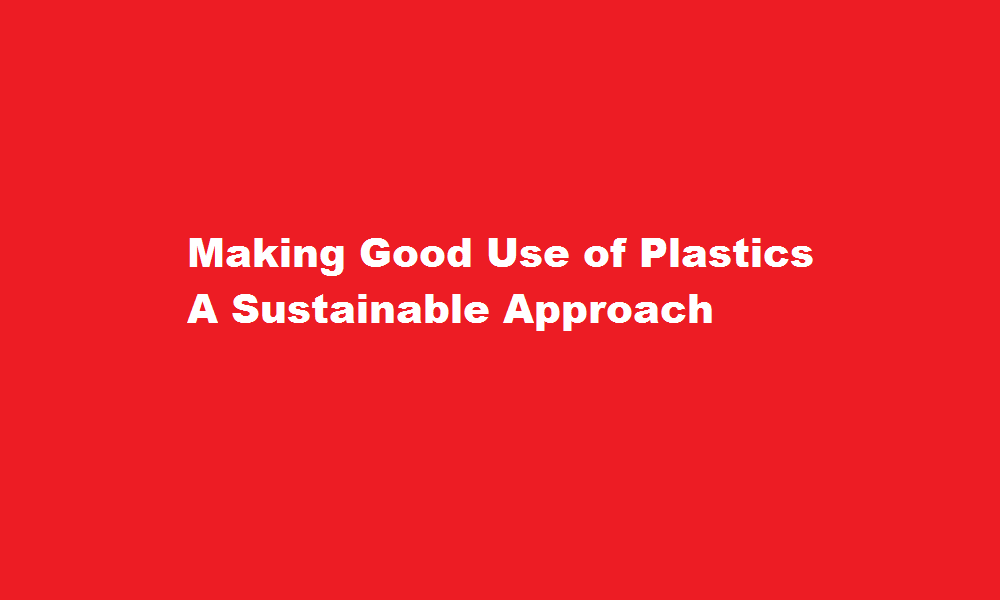Making Good Use of Plastics A Sustainable Approach
3 min read
Introduction
Plastics have become an integral part of our lives due to their convenience and versatility. However, the improper disposal and excessive consumption of plastics have led to severe environmental consequences. To address this issue, it is crucial to adopt a sustainable approach towards plastic use. This article explores innovative ways to make good use of plastics, promoting responsible consumption and waste management practices.
Reducing Single-Use Plastics
Single-use plastics, such as bags, straws, and water bottles, contribute significantly to plastic pollution. By embracing reusable alternatives, we can minimize our plastic footprint. Carrying a reusable water bottle, using cloth bags for shopping, and opting for metal or bamboo straws are simple yet impactful changes. Additionally, supporting businesses that offer plastic-free alternatives and pressuring manufacturers to reduce excessive packaging can collectively make a difference.
Plastic Recycling and Repurposing
Recycling is an effective way to give plastic materials a second life. Sorting and segregating plastics for recycling is essential to ensure proper processing. Many communities provide recycling facilities, allowing individuals to responsibly dispose of their plastic waste. Furthermore, innovative initiatives are emerging, such as turning plastic waste into building materials, furniture, or even 3D printing filaments. These advancements not only reduce the demand for new plastic production but also contribute to circular economies.
Plastic Upcycling and Artistic Endeavors
Plastic waste can be transformed into unique and artistic creations through upcycling. By repurposing plastic items like bottles, caps, and containers, individuals can create art, jewelry, and home decor. Moreover, communities can organize workshops and art programs to raise awareness about plastic waste while fostering creativity. These initiatives not only divert plastic from landfills but also encourage individuals to see the value in discarded materials.
Education and Awareness
Educating the public about the environmental impact of plastic consumption is essential. Schools, NGOs, and government agencies should promote awareness campaigns, teaching children and adults about responsible plastic use. Emphasizing the importance of recycling, reducing plastic waste, and implementing sustainable alternatives can bring about lasting change. Encouraging local communities to participate in beach cleanups, river restoration projects, and recycling drives can further instill a sense of responsibility towards plastic waste management.
FREQUENTLY ASKED QUESTIONS
How do we use plastic everyday?
It dominates the market for beverage bottles and textile fibers. This is also where most waste comes from. While plastic used for building, construction and textiles together makes up another one-third of total production, these products are long-lasting.
How is plastic useful or harmful?
The harmful chemicals released from plastic products throughout their entire life cycle can pose a serious risk to humans and the environment, including when waste is not properly managed, finding its way to air, water and soils.
How can we prevent plastic waste?
Say no to disposable plastic cutlery, plastic straws and other single-use plastics. Avoid plastics that cannot be recycled if other alternatives exist. Avoid products with excess or unnecessary plastic packaging. Adopt reusable items such as water bottles, shopping bags, keep cups and travel cutlery.
Conclusion
To make good use of plastics, it is crucial to adopt a sustainable mindset and actively engage in responsible consumption and waste management practices. By reducing single-use plastics, embracing recycling and repurposing initiatives, exploring creative upcycling options, and promoting education and awareness, we can collectively tackle plastic pollution. It is essential for individuals, businesses, and governments to collaborate and take meaningful action towards a more sustainable future. Together, we can transform our relationship with plastics and protect the environment for generations to come.
Read Also : A Step-by-Step Guide to Applying for Internships on Internshala App






